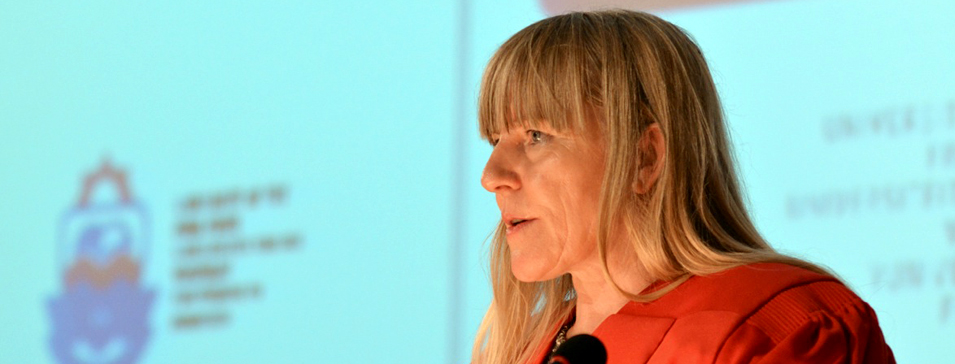Latest News Archive
Please select Category, Year, and then Month to display items
06 April 2018
Photo Rulanzen Martin
 From the left: Dr Thulisile Mphambukeli, leader of the BRICS research team that is exploring the political economy of water and food security, and her research partner, Dr Victor Okorie.
From the left: Dr Thulisile Mphambukeli, leader of the BRICS research team that is exploring the political economy of water and food security, and her research partner, Dr Victor Okorie.
A Brazil, Russia, India, China and South Africa (BRICS) delegation is to hold the 10th Annual BRICS Summit in the last week of May 2018 in Johannesburg. Dr Thulisile Mphambukeli, leader of the University of the Free State (UFS) research team alongside Dr Victor Okorie from the Department of Urban and Regional Planning, in collaboration with Prof Lere Amusan of North-West University, will ensure that water and food security is a prominent feature on the gathering’s agenda.
First, the project titled: “Exploring the political economy of water and food security nexus in BRICS and Africa” will debut at the National Institute for the Humanities and Social Sciences BRICS Think Tank Forum”.
According to Dr Mphambukeli, the key to water security is attitudinal change by means of education and conscientisation. This, she is adamant about, holds the potential to drive behavioural adjustments in the way society interacts with water.
Genetic and social approaches
Dr Okorie asserts that if strides towards reducing the demand for water were to be made, research efforts should be geared towards effecting changes at DNA level. Meaning we need to explore waterwise ways that enable crops and animals to thrive optimally.
The project also looks at social dimensions of water such as flushing a toilet. “Research activities on redesigning toilets, especially the urinal, where more than nine litres of water are used to flush less than one cubic centimetre of urine, are timely in the context of managing water and the food nexus crises,” said Dr Okorie.
Combining the genetic and social approaches would allow us to produce more with a smaller water footprint. This can be made possible by implementing precision agriculture which is about estimating and applying exact quantities of water and nutrients needed for the production of crops or the raising of livestock.
Paradigm shifting policies
Prof Amusan said the team intended to propose functional solutions that take the quality of water into consideration. Equitable production and distribution of water depends on endorsing policies of co-production between citizens, governments and the public sector. BRICS member states mutually consider water and food security as an issue of paramount significance, hence its feature on this prestigious summit’s agenda.
Prof Annie van den Oever envisions the future of film and visual media in her inaugural lecture
2014-02-07

The university formally welcomed Prof Annie van den Oever, an internationally-recognised film and media scholar, within its academic ranks. Her association with the UFS forms part of an exciting new postgraduate programme in film and visual media being created by the Faculty of the Humanities.
Prof Annie van den Oever delivered her inaugural lecture, “Foundational Questions for a Film and Visual Media Programme”, sharing her extensive knowledge in the field. The lecture attracted an international audience with people following the talk via live streaming from places such as Oslo, Berlin and London.
“Annie is quite a connected person through the film and visual media world,” Prof Lucius Botes, Dean of the Faculty of the Humanities, told the audience in the CR Swart Auditorium. He also referred to the fact that, under the auspices of Prof Van den Oever, two staff members from the faculty completed their master’s degrees at the University Groningen where she also teaches. “I am happy to announce that through Annie’s network we can invest in these young people.”
Prof Suzanne Human, Head of the Department History of Art, applauded the senior leadership for its vision to appoint Prof Van den Oever as extraordinary professor. “We have profoundly benefited and will still benefit from Annie’s obvious enjoyment in sharing her considerable experience and expertise in the design of a programme of film and media studies.”
The new postgraduate programme in film and visual media is being developed in partnership with the departments of Art History and Visual Culture Studies, Drama and Theatre Arts, English and the Department of Afrikaans, Dutch, German and French. The university aims to have the first film students enrol in 2015.